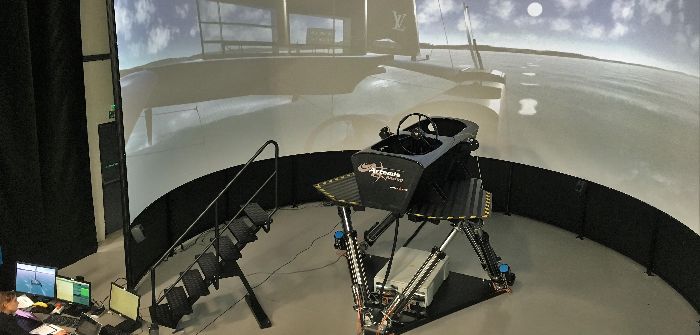Artemis Technologies, a spin-off from America’s Cup challenger Artemis Racing, has developed a new fast craft simulator with Cruden. The system runs on Cruden’s Panthera simulator software and features a bespoke top platform based on a key section of an F50 catamaran.
The simulator will be used for engineering analysis of different designs, developing control systems and training crews for future race series.
“The professional sailing world is starting to take simulation technology seriously, and in making the decision to move ourselves forward with Cruden, who we knew from motorsport, we are confident we have created a new concept of yacht simulator.
“The simulator will enable Artemis Technologies to make design direction decisions much earlier. We learn too much too late, only discovering whether the offline engineering has been successful once we get the boat in the water,” explained Jonathan Nicols, lead systems engineer at Artemis Technologies.
“Importantly, integrating the Cruden simulator and Panthera software has allowed us to focus all our simulation tools into one capstone project. Now, instead of passing data back and forth, our whole toolchain – boat model, control systems, performance prediction software and simulator – can be synced together and used by all groups within the business, with a human-in-the-loop.
“The ability provided by Panthera to overlay simulator data with actual data, as in motorsport, means we can use it to advance race strategy. We can replay actual races because the course, positioning and speed of the boats are logged, with the same weather conditions, and make different decisions and train how to tactically do better.”
The simulator’s realism is essential for crew training, which consists of familiarization with the boat’s latest systems, rehearsing responses to emergency and failure modes, and building muscle memory and rhythm for maneuvers. The platform or cockpit can be changed for each new maritime application.
A 4.5m-high, 210° wraparound screen, the highest ever specified by Cruden, conveys images from three Barco F70-4K6 4K UHD laser phosphor projectors.
Said Maarten van Donselaar, CEO of Cruden, “Cruden has pioneered the use of human-in-the-loop simulators in the marine industry, where the need for new training solutions is strong across the board. This project and the ease of knowledge transfer from motorsport to Artemis Technologies’ application at the pinnacle of yacht racing is testament to the flexibility of our simulator, which is fundamentally a standard product.”
The Cruden hardware was delivered in September 2018 to Artemis Technologies’ base near London. “We have aspirations for the simulator to not only progress our race programs, but potentially to create a new commercial offer – as foiling technology becomes more prevalent in mainstream sailing, it is not as easy to just design or buy a boat and race it anymore. Simulators are an important part of the future of the industry,” concluded Nicols.


